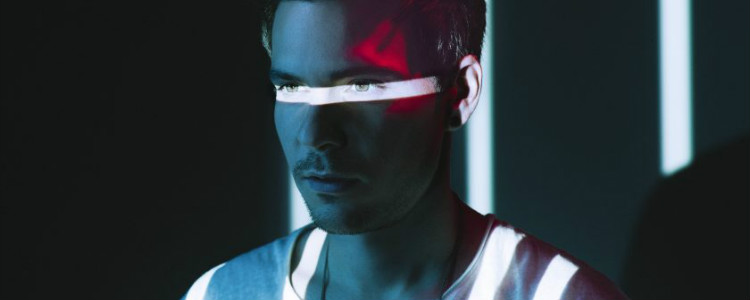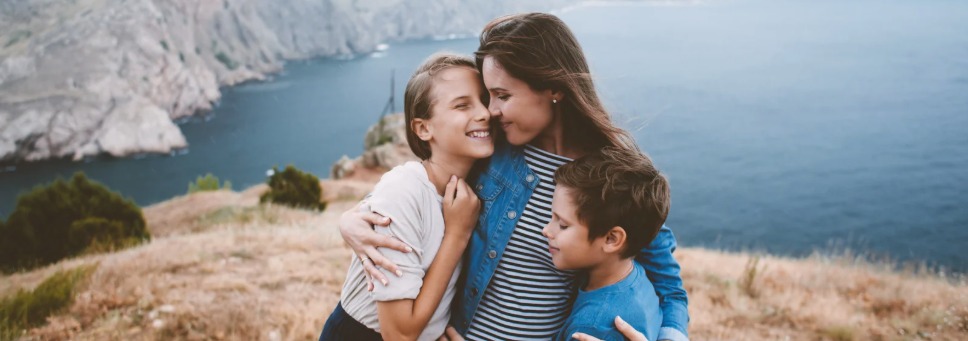I remember being really young when I first became conscious of my unhealthy relationship with body image. It was the classic “being in elementary school” kind of thing; I was bullied for being a little chubby, having to take my shirt off in locker rooms, and being profoundly uncomfortable with day-to-day pressures. I quickly developed this false narrative that my self-worth was directly related to how skinny I was or how I looked. I couldn’t imagine anyone else felt this way and didn’t even think to be open about it as a teenager.
Through my early twenties, I’d have periods of time where the thoughts felt less present and threatening than others, but they were always there in my subconscious. I had a long history of anxiety and panic attacks that were closely tied in with my overall desire to have control. I’d be on tour and have to pull over in the midst of a six-hour panic attack where I couldn’t breathe, my eyes would go blurry and dark, and my limbs would go numb. These attacks were debilitating and intensely scary. I think these experiences got me used to the idea of having a “dark secret” that nobody else knew about, and that frame of mind didn’t help as my disordered relationship with food and exercise got worse.
I’d say that having a career in music contributed to the spikes of anxiety and fears, but really, it just provided more exposure. It served as a canvas for me to see clearly that I had a problem and needed help. Yes, there’s more attention paid to vanity and appearance in this industry (and that’s always been the part of it that I despise), but this would’ve existed in me no matter what I did in life.
For years, my parents and friends would tell me that I looked too thin. In a way, those comments felt like wins because I’d spent years being bullied for the opposite—and the sickness wants to hear those words. I knew how much it affected and saddened the people who cared about me, but it was as if that didn’t even register. It just made me want to be selfish and protect my sickness. So long as I could behave how I wanted, any cost was acceptable.
It was easy to distract myself for long periods of time—touring, producing, and keeping a packed schedule that didn’t allow me to look myself in the mirror so to speak. I was digging myself into the ground and it was only a matter of time before it caught up with me. And it did. I look back on certain experiences that should’ve been so special, and I was too sick to even be present for them. I remember playing Good Morning America in New York one summer and having all my friends and family come see the performance. Instead of being aware and awake for that memory, I woke up two hours early to make sure I got a workout in. It was miserable.
After about two or three years of that behavior, depriving myself of any sort of real nutrition and getting down to an extremely low weight, my heart stopped working. I ended up in the hospital and they wanted to do an emergency surgery to install a pacemaker because my heart rate was so low. My body was shutting down. My hair was actually falling out. I had no energy and couldn’t walk for more than a few minutes without feeling exhausted. I was literally dying. This was two weeks before I’d step on stage to play my first Coachella. It was the year I had my first few hit songs and from the outside, everyone must’ve thought I was thrilled. I was in hell.
This still wasn’t my rock bottom. I continued to find ways to lie to myself that it was “something else” causing all this, but in my heart of hearts, I knew the truth. Something eventually just clicked and I got so tired of being tired. I couldn’t do it anymore and I broke down to my unbelievably supportive and loving family and friends. The amount of support people are willing to give you when you just ask is humbling and life-changing.
I started what seemed like an impossible journey a year and a half ago, but now I am in a much, much healthier place both physically and mentally. It’s a place I didn’t believe I could ever get to again, it felt so far. I lost all joy for a period of time. I didn’t want to experience life or friends. I had no passion. I was a ghost. But slowly, the “me” I knew started to appear again.
I’ve always been fortunate to have music as an outlet. Writing has never been that therapeutic thing some people romanticize, but it’s always been a part of my coping and processing. The song “Dear Ana” kind of wrote itself when the thoughts and lifestyle of this sickness were at its most consuming. I didn’t consciously feel ready to talk about it but as the song happened, I realized I didn’t want to surround the story with shame, but instead use it as an opportunity to talk about something really relevant to me. My favorite artists are my favorite artists because I connect to their authenticity, and to think this story could connect with one person and help them feel a little less alone was enough to warrant the discussion.
Part of my motivation to get healthy was so I could speak about my experience as a male who deals with body dysmorphia, eating disorders, and anxiety, in hopes of it potentially helping someone else. Now, I just want to do everything I can so that kids and adults all know just how okay it is to be open about it. It isn’t crazy, it isn’t incurable, and it feels a whole lot less scary and overwhelming when you realize how many people feel the same way and have the same thoughts that trigger their version of coping behavior. My story is my own, but there are parts of it I know everyone can relate to. This isn’t something to take on alone or feel alone in.
The prison I allowed myself to live in is a place I never want to go back to and I hope anyone who’s experiencing their own version of this takes a deep breath and realizes it DOESN’T have to be this way. Mental illness and eating disorders can affect anyone—every age, race, and gender—and I’m so proud to be a part of a community that builds strength together out of weakness.
Matthew Koma is a genuine hitmaker who burst onto the scene with Zedd’s “Spectrum” and “Years” by Alesso. As a writer, producer, and remixer, Matt has also worked with a wide range of artists including Lady Gaga, Britney Spears, Kelly Clarkson, Shania Twain, and his greatest influence, Bruce Springsteen. Over the last year, Koma has spent his time fully transforming into a solo artist, traveling the world writing emotionally charged music, while playing the world’s largest festivals including Coachella, Ultra Music Festival, Lollapalooza South America, and Life in Color. Matthew’s debut album has him co-producing with some of the most exciting next wave electronic artists including Jai Wolf, Grey, Flux Pavilion, and Louis The Child.
Images courtesy of Timothy Saccenti






